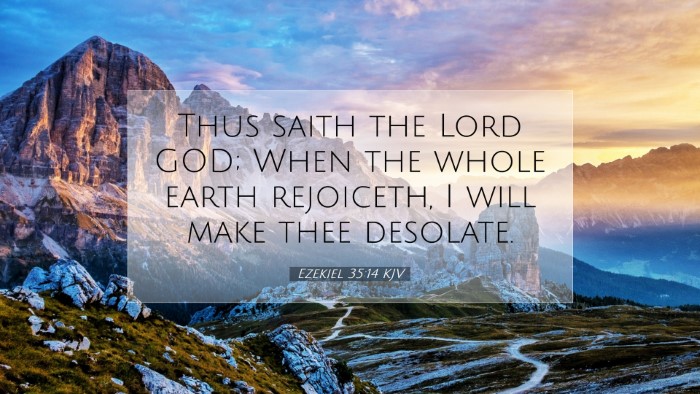Ezekiel 35:14 Commentary
Verse: "Thus saith the Lord God; When the whole earth rejoiceth, I will make thee desolate."
Introduction
This verse emerges from a larger context of judgment pronounced against Edom—symbolizing those who stand against God's people. The prophetic declaration reveals the divine intent to counteract the pride and malice of Edom, particularly in the light of Israel's restoration.
Contextual Overview
The prophecies in the book of Ezekiel focus on themes of judgment, restoration, and hope. Ezekiel, a prophet during the Babylonian exile, articulates God’s messages both to Israel and the surrounding nations. Chapter 35 specifically addresses the nation of Edom, a long-standing adversary of Israel, which had manifested triumphalism during Israel’s captivity.
Judgment Against Edom
The Lord's declaration signifies impending desolation. This judgment serves as a stark contrast to the rejoicing of the earth, highlighting a divine orchestration where those who oppose God’s people will not remain unscathed.
Analysis of the Verse
In this verse, we can dissect several key components:
- "Thus saith the Lord God": This phrase places the emphasis on divine authority. The certainty of God’s word cannot be ignored, especially when it addresses the fate of nations.
- "When the whole earth rejoiceth": This indicates a time of general prosperity or peace. The use of "the whole earth" suggests a universal perspective that contrasts the localized judgment on Edom.
- "I will make thee desolate": The desolation speaks of total destruction, aligning with God’s covenant promises to Israel, emphasizing that evil will not ultimately triumph.
Theological Implications
Ezekiel 35:14 provides profound insights for contemporary theology. The juxtaposition of universal rejoicing against divine judgment illuminates God’s sovereignty over nations. The implications are significant for understanding God’s justice and faithfulness. In contrast to Edom's glee, God's pronouncement cautions against the dangers of pride and animosity towards His people.
Sovereignty of God
Albert Barnes emphasizes God's sovereign authority over all creation. He suggests that regardless of the outward circumstances or seeming victories of the wicked, God’s ultimate plan prevails. This affirms the belief that divine justice will be executed, particularly for those who betray God’s chosen.
Divine Justice and Retribution
Matthew Henry articulates the principle of divine retribution evident in this passage. Those who take delight in the misfortunes of God's people can expect to face judgment. In the broader biblical narrative, we see a consistent theme: God defends His own and holds accountable those who act wickedly.
Practical Applications
For pastors, students, and theologians, Ezekiel 35:14 presents numerous applications:
- Hope in Justice: This verse serves as a reminder of the hope believers have in God's justice. Even when faced with oppression or adversity, they can trust that God will vindicate them in due time.
- Warnings Against Pride: The story of Edom acts as a cautionary tale about the pride that leads to destruction. Believers are challenged to remain humble and compassionate rather than reveling in the struggles of others.
- Encouragement in Conflict: Those in ministry can draw strength from this passage in times of trial. Just as God affirms judgment against Edom, He will support those who remain faithful against opposition.
Conclusion
Ezekiel 35:14 lays a foundation for understanding God’s sovereign role in history, as well as his promised justice. It serves to remind believers that while the earth may rejoice in various seasons, God's hand is at work, ensuring that ultimately, justice prevails. Reflecting on this passage enriches one’s understanding of God’s nature and His dealings with both individuals and nations, urging a posture of humility, faithfulness, and hope.


